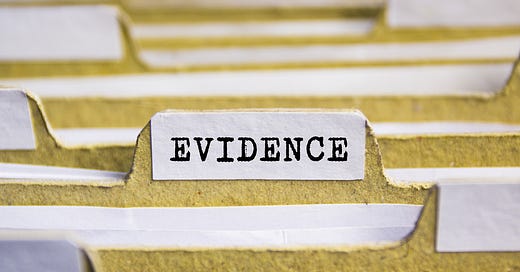Inconclusive Evidence
Research is supposed to offer solutions, but more often than not in the gambling industry, it is inconclusive and further muddies the waters.
The Bulletin Board
VIEWS: Research papers will be a thorn in the side of supporters of online sports betting and online casinos.
NEWS: Massachusetts Gaming Commission meets today to discuss limiting bettors.
NEWS: Rep. Paul Tonko and Sen. Richard Blumenthal take aim at sports betting.
AROUND the WATERCOOLER: The case for a high tax rate in a single chart.
STRAY THOUGHTS: The Gell-Mann Amnesia Effect.
SPONSOR’S MESSAGE - Sporttrade was borne out of the belief that the golden age of sports betting has yet to come. Combining proprietary technology, thoughtful design, and capital markets expertise, our platform endeavors to modernize sports betting for a more equitable, responsible, and accessible future.
Sporttrade’s newest feature, The Tape, prints all trades made on the app in real-time.
Online Gambling’s New Opponent: Research Papers
As the editor-in-chief of Gaming Law Review, I know research and academic papers have a very long runway. From the first draft being submitted to the paper being published can take months to several years. That runway is even longer if you consider the writing process, from idea to research to words on paper.
There is also another consideration: Do I have anything to research? Researching US online sports betting pre-2018 would be extremely difficult, but we are now six years post-PASPA, and several markets have been up and running since 2018/2019. That means academics finally have something to study, and their findings haven’t been overly positive.
Two recent research papers (pre-prints, which have yet to undergo the peer review process) and a state-funded study in Massachusetts have received considerable press.
The first paper, Gambling Away Stability: Sports Betting’s Impact on Vulnerable Households, concludes:
“We find sharp increases in sports betting following legalization. This increase does not displace other gambling activity or consumption but significantly reduces households' savings allocations… These effects concentrate among financially constrained households, who become further constrained as credit card debt increases, available credit decreases, and overdraft frequency rises. Our findings highlight the potential adverse effects of online sports betting on vulnerable households.”
The second, The Financial Consequences of Legalized Sports Gambling, found:
“Our main finding is that overall, consumers' financial health is modestly deteriorating as the average credit score in states that legalize sports gambling decreases by roughly 0.3%... We find a substantial increase in bankruptcy rates, debt collections, debt consolidation loans, and auto loan delinquencies… These results are stronger for states that allow sports gambling online compared to states that restrict access to in-person betting… Together, these results indicate that the ease of access to sports gambling is harming consumer financial health by increasing their level of debt.”
An online survey in Massachusetts found that 25% were problem or disordered gamblers, and another 25% of gamblers were at-risk.
I wrote about the flaws in the Massachusetts study here, but as I suspected, the headline writes itself:
'Going in the wrong direction': Problem gambling up for regular bettors since Mass. OK'd sports bets ~ New England Public Media
Problem Gambling May Be on the Rise Among Monthly Gamblers in Massachusetts, Online Surveys Suggest ~ UMASS
More gamblers tell UMass survey they see more harms than good to betting ~ Mass Live
Of course, what would a gambling debate be without alternative research and surveys?
One is another pre-print titled, Impacts of Access to Legal Mobile Sports Betting on Self-Reported Mental Health: Evidence from Household Pulse Survey, which found:
“This paper provides the first broad-based evidence that, at the population average level, the rapid expansion of legal online and mobile sports betting in the United States has not caused a simultaneous increase in self-reported adverse mental health outcomes nor financial difficulties… Across all measures of mental health in the Household Pulse Survey and for every demographic subgroup, including young men who are more likely to engage in sports betting than any other demographic, we consistently estimate that access to legal mobile sports betting does not cause any statistically significant differences across all outcomes.
“[…]
“Additionally, we find no statistically significant impacts of online sports betting on self-reported financial difficulties, with most of our point-estimated impacts suggesting that legal online gambling is actually associated with better financial status.”
And there is the AGA’s recent survey that found Americans have a largely positive attitude towards legal gambling (which is at odds with some of the Massachusetts survey findings).
“Americans increasingly see the benefits of a legal, regulated gaming marketplace that contributes to communities, prioritizes responsibility, and provides unmatched entertainment,” said Joe Maloney, AGA Senior Vice President, Strategic Communications.
So, what should you make of all this? It’s a messy debate, and as I’ve been saying over the last few weeks, that debate isn’t going to be resolved by data. I’d also add that this is only the beginning. I expect tons of research and academic papers to be published in the coming years, and I don’t expect that research to be conclusive in any way.
So it will just be more of the same: You have your facts, and I have mine.
SPONSOR’S MESSAGE - Join 100s of operators automating their trading with OpticOdds.
Real-time data. Proven trading tools. Built by experts. Meet us at SBC Lisbon & G2E Vegas. Join top operators at www.opticodds.com.
Today Is the Day: MGC Meeting on Limiting Bettors
Mark your calendars. The Massachusetts Gaming Commission will hold its public hearing on limiting bettors today at 10 AM EST. Limiting bettors has fast become one of the most contentious topics in sports betting.
The MGC will split the discussion into two parts (at the request of licensed operators).
Per the agenda, the MGC will have a “Discussion with Sports Wagering Category 1 and Category 3 Operators regarding wager limitations.”
In a separate agenda item, the MGC posted that there will also be a “Discussion with representatives of patrons, responsible gaming and alternative sportsbook models regarding wager limitations.”
The two discussions will likely be diametrically opposed, and the expectation is that the meeting will result in a call for more discussions from the notoriously deliberative regulatory body.
So, who will be in attendance? The MGC is keeping it under wraps, but there are some clues.
Given the MGC's displeasure when every operator other than Bally’s skipped the May roundtable, the first panel will undoubtedly feature a representative from every licensed sportsbook in Massachusetts: Bally Bet, BetMGM, Caesars, DraftKings, ESPN Bet, Fanatics, and FanDuel. That means lots of lawyers and compliance departments.
Panel 2 is where the real fireworks are expected.
Richard Schuetz, the CEO of the newly formed non-profit American Bettors’ Voice, has been confirmed. His participation was leaked via a tweet.
On the responsible and problem-gambling front, I would also expect a return appearance from Brianne Doura-Schawol, who is an MGC favorite (for good reason). The MGC could also turn to Dr. Rachel Volberg. Volberg is the Principal Investigator on the Massachusetts Gaming Commission’s Social and Economic Impacts of Gambling in Massachusetts (SEIGMA) study.
Dustin Gouker and “Captain” Jack Andrews participated in the first roundtable. While they may or may not return, the panel will almost certainly include similar voices representing bettors and media sympathetic to the topic.
Then there are the “alternative sportsbook models” representative(s), who will likely be there from the exchange and/or sharp side aisle.
Rep. Paul Tonko Is Ready to Unveil the SAFE Bet Act
Rep. Paul Tonko has waged a one-man crusade against sports betting over the last two years, but now he is bringing in some reinforcements.
Tonko and Sen. Richard Blumenthal will hold a press conference Thursday at 1 PM EST to announce new legislation addressing mobile sports gambling (The SAFE Bet Act). Tonko unveiled a framework for the SAFE Bet Act earlier this year.
The lawmakers will be joined by two members of the Public Health Advocacy Institute (PHAI) at Northeastern University School of Law (the PHAI is suing DraftKings in MA over its bonus offerings) and the father of a recovering disordered gambler:
Mark Gottlieb, Executive Director, PHAI
Harry Levant, Gambling Policy Adviser, PHAI, and gambling therapist, Ethos Treatment Center
Gordon Douglas, father of an individual in recovery for gambling disorder
The bill hasn’t been released yet, but the framework (released in March), targeted everything from advertising to affordability checks to credit cards to AI.
As I reported in March, the SAFE Bet Act framework:
Prohibits advertisements using bonuses or boosts.
Prohibits advertising during live sports events.
Prohibits using AI to track players’ gambling habits, create a customer-specific promotion, or create betting markets ( the last being a potentially game-changing demand).
Limits deposits from a single customer to no more than five in a 24-hour period.
Requires affordability checks if a wager exceeds a certain amount.
Prohibits deposits via credit cards.
SPONSOR’S MESSAGE - Underdog: the most innovative company in sports gaming.
At Underdog we use our own tech stack to create the industry’s most popular games, designing products specifically for the American sports fan.
Join us as we build the future of sports gaming.
Visit: https://underdogfantasy.com/careers
Around the Watercooler
Social media conversations, rumors, and gossip.
In yesterday’s Watercooler section, I posted a list from Ryan Butler showing the upheaval the Colorado sports betting market has experienced since its launch.
Today, it’s another powerful visual from X, this time courtesy of Alfonso Straffon:
Conventional thinking is that when states try to plug budget deficits, they will look to new forms of gambling, but I suspect quite a few states may decide to just increase the current tax burden on sports betting operators. Maybe not to New York levels, but the days of under 20% tax rates may be numbered.
Stray Thoughts
in 2002, Michael Crichton coined something he called the "Gell-Mann Amnesia effect,” which he summarized thusly:
“You open the newspaper to an article on some subject you know well. In Murray [Gell-Mann]'s case, physics. In mine, show business. You read the article and see the journalist has absolutely no understanding of either the facts or the issues. Often, the article is so wrong it actually presents the story backward—reversing cause and effect. I call these the "wet streets cause rain" stories. Paper's full of them. In any case, you read with exasperation or amusement the multiple errors in a story, and then turn the page to national or international affairs, and read as if the rest of the newspaper was somehow more accurate about Palestine than the baloney you just read. You turn the page, and forget what you know.”
I experience this phenomenon daily. I’m pretty plugged into the gambling industry, and I open a lot of articles and spend (too much) time browsing social media. It’s common that I see a story or, more often, a social media post that I know for a fact is misinformed or flat-out wrong.
This is another reason, as I previously wrote, we all need to get out of our bubbles.
“When your only perspective comes from inside a particular bubble, your view will be very limited…
“The result is far too many gatekeepers who believe that what resonates inside their bubble is the answer; no other proof is needed. This amounts to a peer-review stamp of approval. They must be on the right path if their circle retweets and likes their social media posts and shares their articles/papers/conference appearances.
“They are holding their hammers and looking for nails.”







